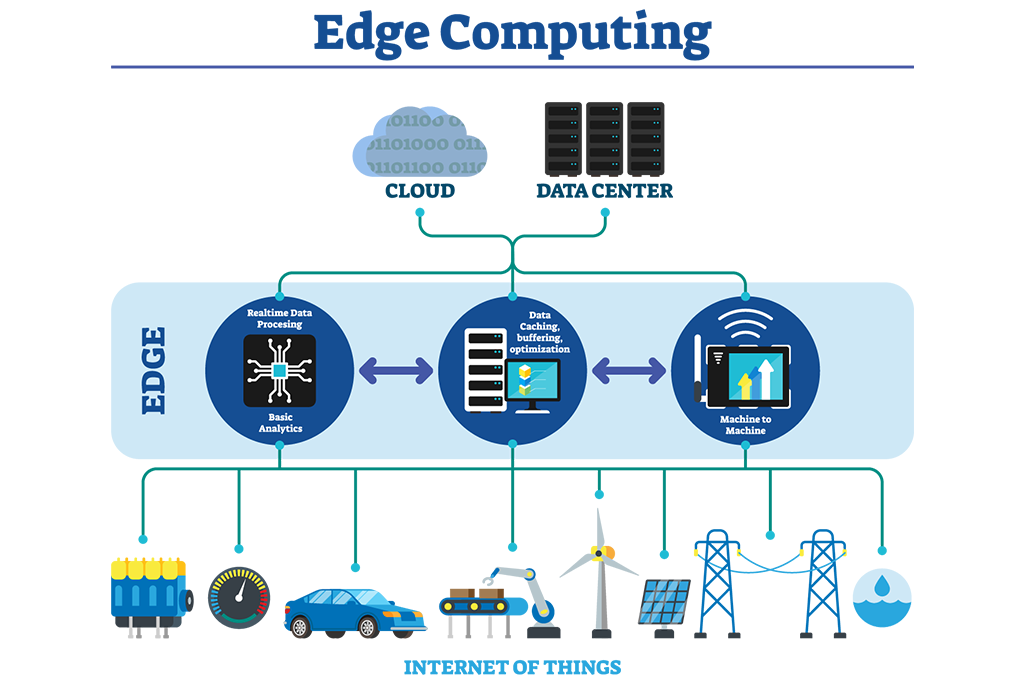
Benefits of Edge Computing & Impact on Business Operations
In today's fast-paced and data-driven world, businesses are constantly seeking innovative solutions to stay ahead of the competition. Edge computing offers a paradigm shift in data processing that can unlock new possibilities and drive unprecedented growth. Keep reading to discover the game-changing benefits of edge computing and how it can revolutionize businesses like yours today!
Understanding Edge Computing
Edge computing is a revolutionary approach to data processing, bringing it closer to the source of generation. Unlike traditional cloud computing, which relies on centralized servers, edge computing enables data processing at the edge of the network, near the devices and sensors generating the data. This paradigm shift allows for faster data analysis, real-time decision-making, and reduced latency.
Edge computing empowers devices located in remote areas to perform data processing at the "edge" of the network, utilizing either the device itself or a nearby server. Additionally, when it becomes necessary to process data in the central data center, only the most critical information is transmitted, resulting in the minimization of latency.
By processing data at the edge, businesses can overcome the limitations of relying on distant cloud servers, especially in scenarios where real-time responsiveness is critical. Edge computing empowers businesses to unlock new possibilities and explore innovative applications that were previously constrained by latency and network limitations.

Enhanced Performance and Reduced Latency
One of the key benefits of edge computing is its ability to enhance performance and reduce latency in real-time applications. With edge computing, data is processed and analyzed closer to the source, eliminating the need to transmit data to a remote server for processing. This significantly reduces the delay in data transmission and enables real-time decision-making.
Industries comprised of autonomous vehicles, smart cities, and industrial automation heavily rely on real-time applications to stay ahead of the competition. However, the success of these industries hinges on their ability to process and analyze data in the blink of an eye. This is where edge computing enters the picture, revolutionizing the way businesses operate.
By leveraging edge computing, these industries can experience a significant boost in performance, faster response times, and increased operational efficiency. Imagine a scenario where an autonomous vehicle needs to make split-second decisions to avoid an accident.
With traditional cloud computing, the vehicle would have to transmit data to a remote server for analysis, causing a delay that could have life-threatening consequences. However, with edge computing, the data is processed right at the edge of the network, enabling real-time decision-making and ensuring the safety of passengers and pedestrians.
Edge computing plays a pivotal role in transforming smart cities into more efficient and sustainable environments. By processing data at the edge, cities can collect and analyze information from various sensors and devices in real-time. This enables them to make data-driven decisions to optimize energy usage, improve traffic flow, and enhance public safety. With edge computing, smart cities can truly live up to their name, creating a better quality of life for their residents.
Why do businesses use edge computing?
Businesses are increasingly turning to edge computing to optimize the response times of their remote devices and gain valuable insights from device data. By leveraging edge computing, businesses can achieve real-time computing capabilities in locations where it would typically be unattainable, while also reducing network congestion and data center strain.
Without the implementation of edge computing, the sheer volume of data generated by edge devices would overwhelm most business networks, leading to operational disruptions and potentially catastrophic consequences. IT costs could skyrocket, customer satisfaction could plummet, and valuable equipment could be compromised or underutilized. Most critically, the safety of workers in industries reliant on intelligent sensors would be at risk.
By bringing data processing closer to the source, businesses can effectively manage and analyze data in real-time, ensuring optimal performance and safety. With edge computing, businesses can unlock new possibilities and overcome the limitations that traditional computing models impose.
Improved Data Security
Data security is a paramount concern for businesses in the digital age. Edge computing offers enhanced data security by fortifying networks at the edge. Unlike traditional cloud computing, where data is transmitted and stored in centralized servers, edge computing keeps sensitive data closer to its source, reducing the risk of data breaches and unauthorized access.
In addition to minimizing exposure to security threats, edge computing offers businesses a range of other advantages when it comes to data security. By processing and storing data locally, businesses can maintain greater control over their sensitive information. This control is essential for ensuring compliance with stringent security regulations, such as the General Data Protection Regulation (GDPR) in the European Union.
Robust Security Measures
With edge computing, businesses can implement robust security measures at the edge of their network. This allows for the implementation of encryption, access controls, and other security protocols directly on the edge devices themselves. By fortifying networks at the edge, businesses can protect their valuable assets from unauthorized access and potential breaches.
Edge computing enables businesses to maintain customer trust by safeguarding their personal information. With the increasing number of high-profile data breaches and privacy concerns, customers are becoming more cautious about sharing their data. By adopting edge computing, businesses can assure their customers that their data is being processed and stored securely, instilling confidence and maintaining trust.
Edge computing revolutionizes data security by offering businesses greater control, compliance with regulations, and enhanced protection against security threats. By embracing edge computing, businesses can protect their valuable assets, maintain customer trust, and stay ahead in an increasingly digital and data-driven world.

Cost Efficiency and Bandwidth Optimization
Edge computing revolutionizes businesses by offering significant cost efficiency and bandwidth optimization advantages. By processing and filtering data at the edge, only the most relevant and valuable information is transmitted to the cloud or data center, reducing bandwidth requirements and associated costs.
What's more, edge computing reduces reliance on high-speed internet connectivity as data processing occurs locally. This not only saves costs but also ensures uninterrupted operations even in scenarios where internet connectivity is limited or unreliable. With edge computing, businesses can streamline their data management strategies, optimize resource allocation, and achieve substantial cost savings.
Enabling IoT and AI-driven Innovations
Edge computing plays a crucial role in enabling the Internet of Things (IoT) and AI-driven innovations. By bringing data processing closer to IoT devices and sensors, edge computing facilitates real-time analytics, predictive maintenance, and intelligent decision-making.
With edge computing, businesses can leverage the power of AI algorithms on the edge devices themselves, reducing the need for constant data transmission to the cloud and minimizing latency. This empowers businesses to unlock the full potential of IoT and AI-driven technologies, enabling smart and autonomous systems that can revolutionize various industries.
Ready to tap into the potential of Edge Computing for your business? Reach out to us now and connect with our team of seasoned sales professionals. Don't miss out on this opportunity to revolutionize your operations and stay ahead in the digital era!




COMMENTS